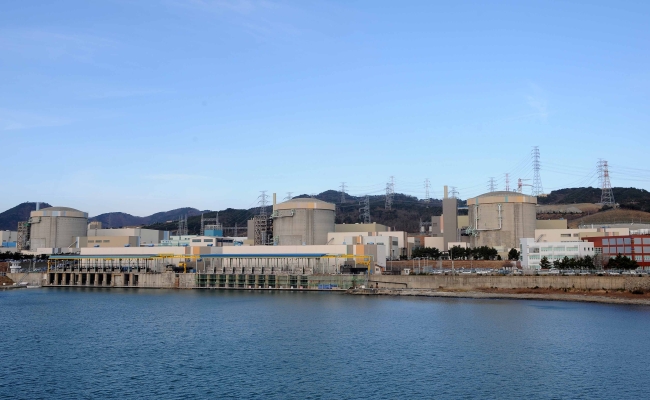[Newsmaker] South Korea may freeze nuke energy at 22-29%
By Korea HeraldPublished : Oct. 14, 2013 - 20:14

The nation will most likely freeze the portion of nuclear power in its total energy generation at between 22 to 29 percent by 2035, based on recent recommendations from a joint working group on the second phase of the national energy framework on Monday.
Although not a binding directive, the group is considered to have sway in energy policy.
Monday’s recommendations mark a sharp turn around from the previous Lee Myung-bak government in 2008 when another working group called for nuclear energy to account for up to 41 percent.
At the same time, the recommendations said renewable energy should continue to account for about 11 percent of the country’s power generation, which was changed little from the recommendations under former president Lee.
The latest adjustment comes following the 2011 nuclear accident in Fukushima, which sparked debate over the safety and sustainability of nuclear energy. Adding to concerns, Korea is still recovering from a series of corruption cases involving substandard parts and false parts certifications.
On Monday, experts and lawmakers argued over the feasibility and the pros and cons of the new energy framework, with some against the plan warning of a surge in electricity prices as nuclear power is relatively low-priced.
“At the same time, the consumers would also have to bear the cost of developing renewable energy, which is a very slow process,” said Suh Kune- yull, a professor at the College of Engineering, Seoul National University. Further, consumers would have to share the costs of importing coal and liquefied natural gas.
As of the end of 2012, coal (39 percent) and LNG (22.4 percent) comprised over half of Korea’s energy generation. Nuclear power accounted for 29.5 percent. Alternate energy sources such as solar and wind power take up a mere 2.1 percent.
However, others talked of the positive effects of renewable energy plans.
“Though the cost to generate energy will increase in the short run, this will benefit consumers in the long term as renewable technologies see gradual growth now, reducing the costs, and nuclear energy has risk factors,” said Hong Jong-cheol, a manager of future strategy policy division at Korea Institute of Energy Research Future.
By Shin Ji-hye (shinjh@heraldcorp.com)
Although not a binding directive, the group is considered to have sway in energy policy.
Monday’s recommendations mark a sharp turn around from the previous Lee Myung-bak government in 2008 when another working group called for nuclear energy to account for up to 41 percent.
At the same time, the recommendations said renewable energy should continue to account for about 11 percent of the country’s power generation, which was changed little from the recommendations under former president Lee.
The latest adjustment comes following the 2011 nuclear accident in Fukushima, which sparked debate over the safety and sustainability of nuclear energy. Adding to concerns, Korea is still recovering from a series of corruption cases involving substandard parts and false parts certifications.
On Monday, experts and lawmakers argued over the feasibility and the pros and cons of the new energy framework, with some against the plan warning of a surge in electricity prices as nuclear power is relatively low-priced.
“At the same time, the consumers would also have to bear the cost of developing renewable energy, which is a very slow process,” said Suh Kune- yull, a professor at the College of Engineering, Seoul National University. Further, consumers would have to share the costs of importing coal and liquefied natural gas.
As of the end of 2012, coal (39 percent) and LNG (22.4 percent) comprised over half of Korea’s energy generation. Nuclear power accounted for 29.5 percent. Alternate energy sources such as solar and wind power take up a mere 2.1 percent.
However, others talked of the positive effects of renewable energy plans.
“Though the cost to generate energy will increase in the short run, this will benefit consumers in the long term as renewable technologies see gradual growth now, reducing the costs, and nuclear energy has risk factors,” said Hong Jong-cheol, a manager of future strategy policy division at Korea Institute of Energy Research Future.
By Shin Ji-hye (shinjh@heraldcorp.com)
-
Articles by Korea Herald



![[Exclusive] Korean military set to ban iPhones over 'security' concerns](http://res.heraldm.com/phpwas/restmb_idxmake.php?idx=644&simg=/content/image/2024/04/23/20240423050599_0.jpg&u=20240423183955)

![[Graphic News] 77% of young Koreans still financially dependent](http://res.heraldm.com/phpwas/restmb_idxmake.php?idx=644&simg=/content/image/2024/04/22/20240422050762_0.gif&u=)



![[Pressure points] Leggings in public: Fashion statement or social faux pas?](http://res.heraldm.com/phpwas/restmb_idxmake.php?idx=644&simg=/content/image/2024/04/23/20240423050669_0.jpg&u=)










